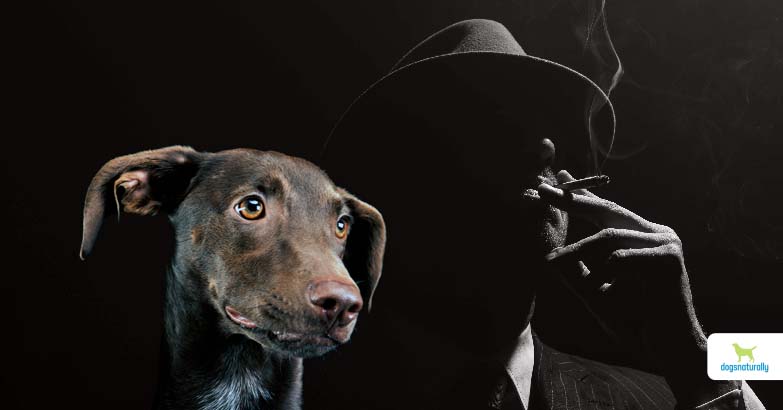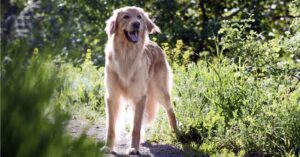Is Second Hand Smoke Bad For Dogs? Yes it can. Second hand smoke affects adults, children … and pets (even birds and goldfish). And in the United States, smoking is the leading preventable cause of death, disease, and disability. You read correctly … the diseases caused by second hand smoke in dogs are preventable.
What Is Second Hand Smoke In Dogs?
Second hand smoke is the smoke from a person smoking that lingers in the air for your dog to breathe. It settles from the air, close to the ground, where your dog spends all of his time (and small children do too!). All of the chemicals a smoker breathes out, your dog breathes in.
Every time a smoker exhales from a cigarette, a cigar or a pipe, she fills the air with second hand smoke. And within that smoke are more than 7,000 chemicals … that your dog can inhale.
And your dog can’t escape it. He can’t step outside, close the door or demand the smoking stop. And if he could do any of those things … he’d still have to contend with thirdhand smoke! We’ll get into that later.
The Federal Drug Administration (FDA) lists 93 of those 7,000 chemicals on its list of Harmful and Potentially Harmful Constituents in Tobacco Products and Tobacco Smoke.
They include:
- Ammonia (deadly, corrosive, used in fertilizer)
- Arsenic (used in electronics, cancer-causing)
- Benzene (cancer-causing industrial chemical)
- Carbon monoxide (odorless gas that can cause death)
- Formaldehyde (toxic gas often used in manufacturing)
- Hydrogen cyanide (a fatal compound)
- Lead and mercury (heavy metals)
- Nicotine
- Toluene (found in crude oil and used in paint products)
- Uranium-238 (used in nuclear fuel)
So even though this is about second hand smoke … anywhere there’s smoke there’s nicotine, and that has its own set of dangers for your dog.
Is Nicotine Bad For Dogs?
Even small amounts of nicotine in the air from cigarette smoke can be toxic to your dog. This 1985 study introduced cigarette smoke to the lungs of dogs and then injected their blood into recipient dogs (1). It caused bronchoconstriction plus central respiratory stimulation and increased breathing and other effects.
A 2007 study used dogs from the homes of smokers. Results showed a significant increase in the macrophages and lymphocytes of dogs from homes where there was smoking. This demonstrated the dogs had an immune response to the cigarette smoke (2).
But your dog can get into even more trouble. He may get into your ashtray and eat cigarette or cigar butts. Or he can get into the supplies for e-cigarettes and drink the nicotine refill liquid, chew on the refill canisters or chew on the devices themselves. Or find some chewing tobacco. Or nicotine gum. The result is the same … not good at all (and we’re not even mentioning marijuana)!
Small amounts of nicotine, 20 to 100 mg, have been fatal in dogs and cats. A regular cigarette can contain 9 to 30 mg of nicotine. A cigar can contain 15 to 40 mg. Cigarette butts can contain 5 to 7 mg of nicotine. It doesn’t take much to make a dog sick.
Even a pet bird can get nicotine poisoning if he swoops down to an ashtray and escapes with a butt. Many of the chemicals released in cigarette smoke are water soluble so even the fish in your fishbowl or aquarium are at risk if there’s a smoker in the house.
So nicotine poisoning is not something to take lightly.
Signs Of Nicotine Poisoning In Dogs
These are some symptoms of second hand smoke in dogs. If you think your dog has nicotine poisoning, here’s what you might see:
- Vomiting
- Unsteadiness
- Drooling
- Tiredness
- Racing Heart Rate
- Shaking
- Weakness
- Seizures
- Death
Cigarette smoke can kill your dog. If you think your dog has eaten even one cigarette butt, don’t hesitate to get him to your vet. There isn’t an antidote so your dog needs immediate treatment as soon as possible.
There are few risks to your dog that you can actually see. Second hand smoke is one of them.
Is Second Hand Smoke Bad For Dogs? … Why?
Any problem your dog has can be made worse by second hand smoke … or it can lead to new problems. And, while we can’t ask them, it’s likely that dogs hate cigarette smoke. Here’s what happens if a dog is exposed to smoke …
Affects Existing Health Issues
If your dog already has a breathing issue …very common in brachycephalic breeds like pugs … second hand smoke can make it worse. And it can worsen existing problems and lead to chronic coughing. Dogs who live with second hand smoke also have more eye infections, allergies and other respiratory issues.
Challenges The Immune System
Dogs react to smoke as a smoker would. They can develop an immune response and create a type of white blood cell called an alveolar macrophage. These cells try to destroy abnormalities and infections in the lungs, and try to get rid of particles of tobacco smoke, dust, or plant pollen. They also signal other cells in the immune system for help.
So a dog who lives with a smoker will have an increased number of alveolar macrophages to try to eliminate the tobacco smoke particles. And some of these macrophages contain black smoke particles and toxins—that are held in their lungs. And with increased demand and stress on the immune system to remove smoke particles, diseases, and even cancer, can take hold.
Can Lead To Nasal Cancer
Second hand smoke can affect a dog just because of the length of his nose. A dog’s nose is an air filter that traps particles in the air like dust, pollen and tobacco smoke. That keeps these particles out of his lungs but then he’s holding those contaminants and toxins in his nose. And a dog with a bigger nose will hold more particles.
Greyhounds, Borzois and Doberman Pinschers are long-nosed breeds that have a double risk of nasal cancer when exposed to tobacco smoke. Your dog can’t blow his nose like you can … so all of those chemicals and toxins listed earlier can be held in his nose, increasing the risk for nasal cancer. A 1998 study concluded there is an association between environmental tobacco smoke and canine nasal cancer, especially in long-nosed breeds (3).
You might think that lessens the chances for lung cancer … but you’d be wrong.
Can Dogs Get Lung Cancer From Second Hand Smoke?
Breeds with short and medium snouts, like Pugs, Bulldogs, Beagles and Brittany Spaniels, have a higher risk of lung cancer. That’s because their noses provide a shorter filter so the toxins go directly into their lungs. These fine particles embed themselves deep in the lungs.
Can Dogs Get High From Second Hand Smoke?
Yes, they can. The chemicals in the air will have a more intense influence on your dog because his sense of smell is already highly sensitive. And he can be extremely distressed by any effect it has on him physically, as well as by the smell itself.
And if second hand smoke isn’t bad enough, third hand smoke stays around even longer … for weeks, months and even years.
What Is Third Hand Smoke?
Third hand smoke is the residue that remains after the initial puff of smoke dissipates from the air. It’s just as bad as second hand smoke in dogs. These harmful components, including nicotine, settle on skin, clothes, furniture and carpets. Have you ever seen the yellowed walls of a house where a smoker lives? Even though it’s settled on the wall, floors, ceilings and furniture, particles and gases are still released into the air.
Dogs not only breathe in these substances, they swallow them when grooming themselves or even licking their owner’s skin or clothes.
DNM RECOMMENDS: Four Leaf Rover offers Protect, an everyday soil-based probiotic that helps the body remove and detoxify toxins. Buy Protect now >>
There’s only one way to avoid second hand smoke in dogs. Quit smoking (especially in the house) … and avoid going near anyone who smokes. Don’t take your dog anywhere there’s smoking. Remember, your dog doesn’t have a choice.
References
1. Hartiala JJ, et al. Nicotine-induced respiratory effects of cigarette smoke in dogs. J Appl Physiol. (1985). 1985 Jul;59(1):64-71.
2. Roza MR, Viegas CA. The dog as a passive smoker: effects of exposure to environmental cigarette smoke on domestic dogs. Nicotine Tob Res. 2007 Nov;9(11):1171-6.
3. Reif JS, Bruns C, Lower KS. Cancer of the nasal cavity and paranasal sinuses and exposure to environmental tobacco smoke in pet dogs. Am J Epidemiol. 1998 Mar 1;147(5):488-92.











